"Roman" with a stone: premiere of "The Master and Margarita" at the Army Theater
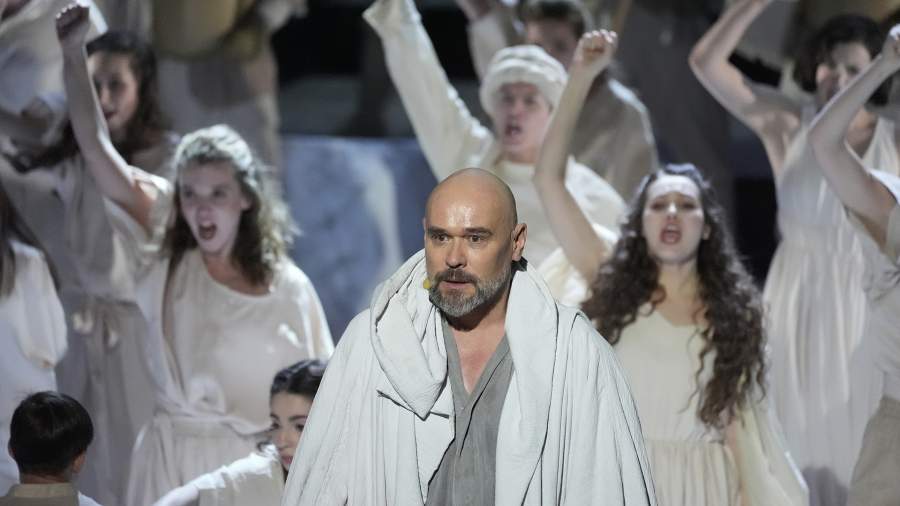
The Russian Army Theater presented a new production of "The Master and Margarita". The play is called "Roman", starring Alexander Domogarov, Maxim Averin, Alexander Baluyev. The plot is based on the line of Pontius Pilate. For the first time in the history of the theater, a tank entrance was opened to create the mysterious world of Mikhail Bulgakov's heroes. And a cavalry of live stallions and fifty dancing artists stepped onto the stage. Izvestia visited the premiere and shuddered from the impressions.
Manuscripts don't burn
Roman is the first production by Alexander Lazarev, People's Artist of Russia, as the chief director of the Russian Army Theater. It took him three years to stage Bulgakov's The Master and Margarita. Perhaps he planned to carry it out on the stage of his native Lenkom. But when Alexander Alexandrovich was invited to a responsible position, he realized that the Army Theater was the place where he could realize his dream.
Lazarev took only the part of "The Master and Margarita" as the basis of the play, which tells the story of Pontius Pilate. Some people often miss it. It's more interesting to keep an eye on Woland and his entourage. But it was no coincidence that Bulgakov included the Roman's storyline in his novel. It is about the cruel fifth procurator of Judea that the Master writes his manuscript. It turns out to be a kind of novel within a novel.
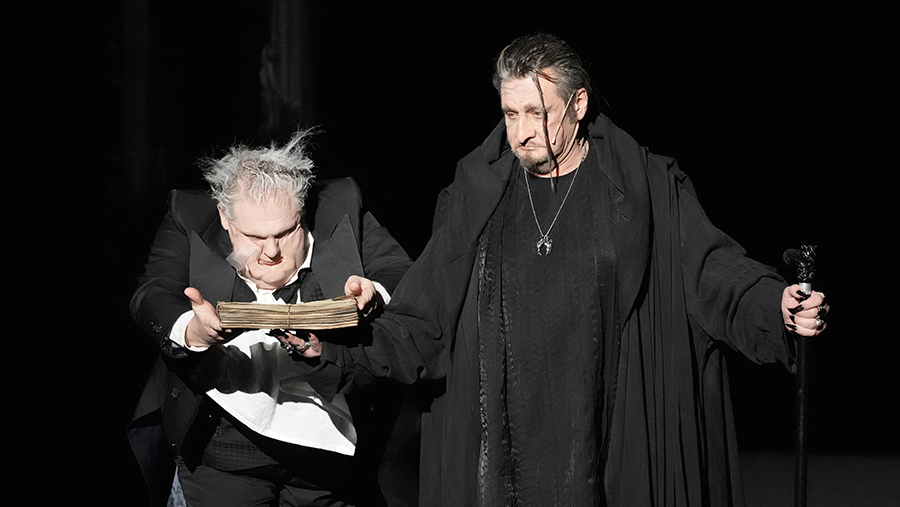
Even those who have not read the book know these lines from Bulgakov: "In a white cloak with a bloody lining, with a shuffling cavalry gait, in the early morning of the fourteenth of the spring month of Nisan, the procurator of Judea, Pontius Pilate, entered the covered colonnade between the two wings of Herod the Great's palace." There is a huge stone in the center of the stage. Inside it, a hollow is hollowed out, in which the one who has to decide the fate of mankind is hiding. But he doesn't feel it yet. Pilate hides from the light with his oversized cloak. They bring to him the prisoner Yeshua Ha-Nozri, who was sentenced to death by the Sanhedrin for neglecting Caesar's authority.
Alexander Lazarev rethinks the role of the brutal prosecutor of Judea. Having committed a terrible crime, Pilate feels the pangs of conscience. He appears as a man who is restless and suffering from remorse for having executed the wrong person. This role is played by Maxim Averin. The second team consists of Alexander Baluyev. Alexander Domogarov appears in the image of Woland. The story begins with him.
Domogarov's retinue
Woland is sitting on the stage in a chair with his back to the audience. The fire crackles in the fireplace, the clock is ticking. The charming vampire Hella (Alyona Gubanova) is sitting at her feet. At the table are the Cat Behemoth (Andrey Kochinov), who is about to burst from gluttony, and Azazello (Sergey Fedyushkin). Koroviev (Roman Radov) brings Margarita (Ekaterina Sharykina). Alcohol is presented to her. This is followed by Woland's offer to fulfill any wish.
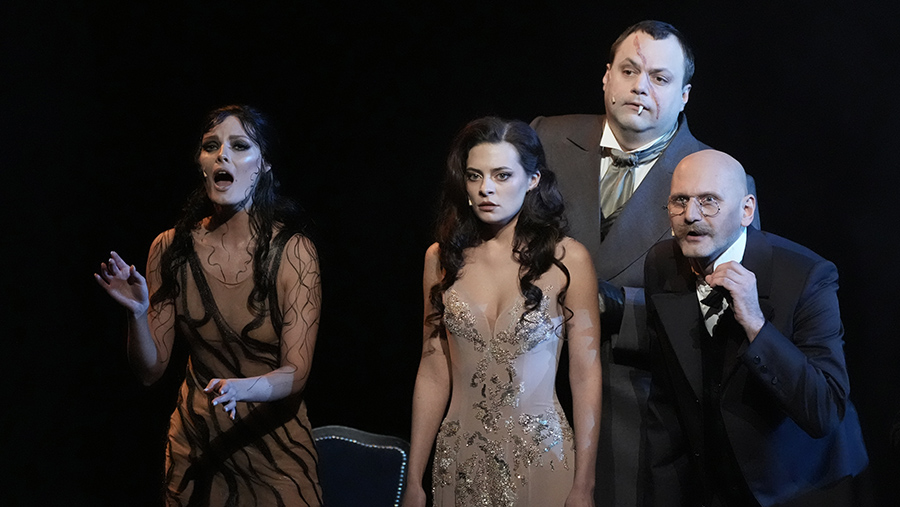
Finally, the audience sees Alexander Domogarov in a sinister make-up. He had an aquiline nose, an earring in his ear, and a dreadlocked hair parted to the left. There are terrible blue veins on his face, and his black—manicured hands are dotted with the same vessels. Fingers in rings. There's a devil on the lapel of his coat. In his hands is a cane with a knob in the shape of a boar's head. The image is diabolical.
Margarita does not dare to ask for herself, she promised to put in a good word for Frida. But for such courage, Woland decided to fulfill another wish of the girl. And then she asked to be returned to her lover, the Master (Konstantin Dneprovsky), who wrote a novel about Pontius Pilate and, frightened, burned it. "The manuscripts are not burning," says Volland, and the Hippopotamus Cat takes out an intact folder with pages of an unfinished book from the fireplace.
Tanks belong here
Bulgakov's text is very cinematic. Its action is transferred from the USSR to 2 thousand years ago and back. But how can such time jumps be reproduced in the theater? It's not an easy task.
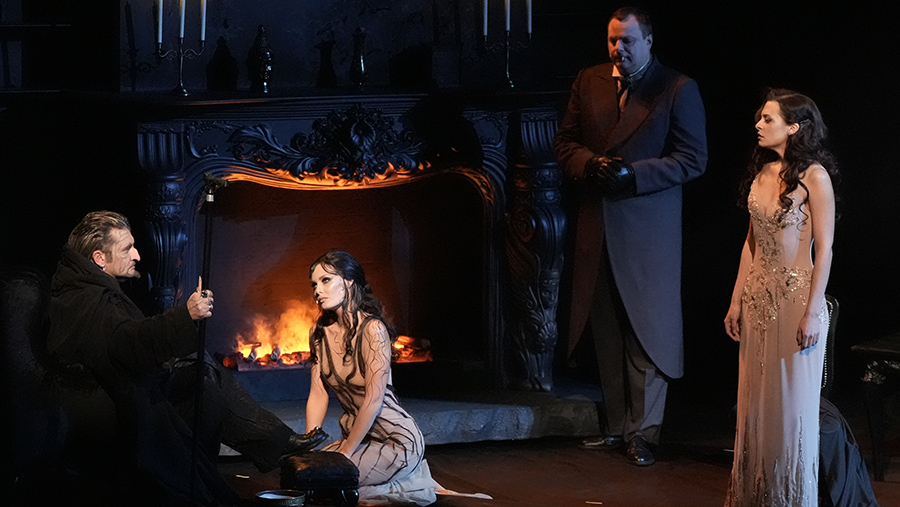
— Thanks to the capabilities of the stage, we decided on this idea,— admitted Alexander Lazarev. — What they have come up with is possible only here and now. All the machinery is used in the performance.
The scenery moves on two turning circles. 12 plungers are loaded (the mechanized lifting part of the stage plan). And for the first time in the history of the theater, a tank entrance was opened to create the mysterious world of Mikhail Bulgakov's heroes. The one that viewers don't have access to at all. At some point in the performance, the backdrop of the stage is exposed, and the audience sees the departing ray of the sun, which Pilate dreams of.
Lighting designer Evgeny Vinogradov has created a stunningly beautiful lighting score. The Army Theater has the largest stage in Europe, and it's difficult to master it. You can make it using wide strokes. Together with the production designer Olga Nikitina, Evgeny Vinogradov created several worlds on it: Woland's bedroom, Herod's palace, the Master's apartment, Golgotha.
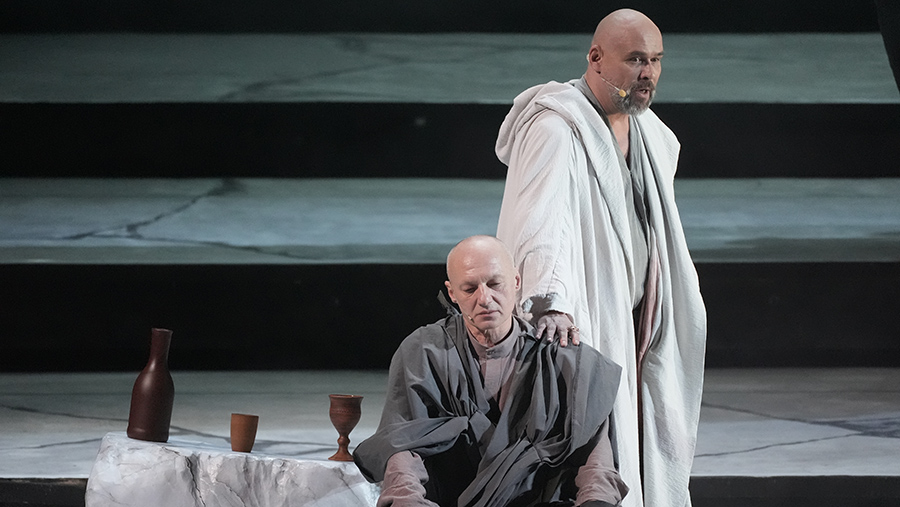
Olga Nikitina was also responsible for the costumes in the production. The most difficult thing was to create a white cloak for Pontius Pilate.
— I didn't want to make a bloody fight — I wanted to grab some kind of metaphor, the image of Pilate, - Olga Nikitina told. — I have come up with such an expressive means as dried blood soaked through the cloak for many years. Pilate drags his hem behind him like a weight.
Maxim Averin is a guest artist. He serves on Mark Zakharov's Lenkom. Working with Lazarev is not new to him. Alexander put a "Run" on Bulgakov on it. As the director says, he gathered on stage not only amazing actors, but also friends. It's a gift to get such artists when you don't have to explain anything, when the principles and thoughts coincide.
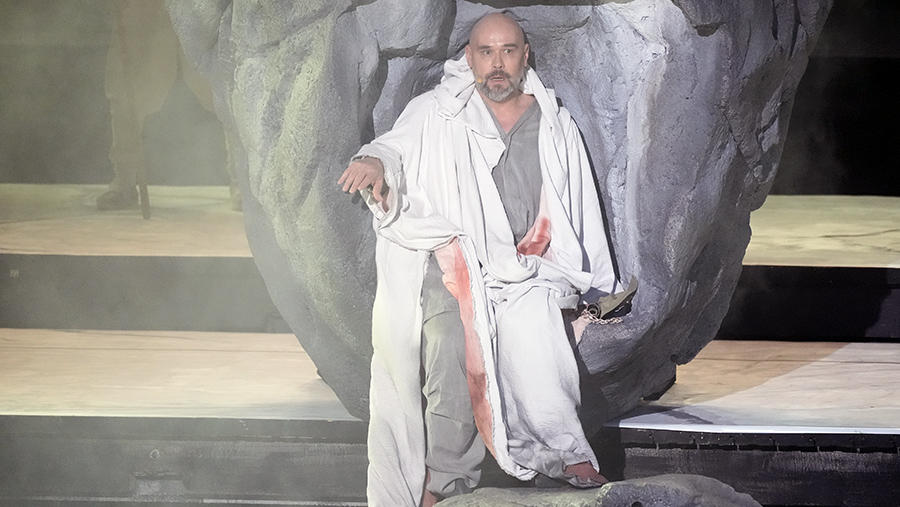
— Bulgakov's novel has many layers, but I decided to focus on the story of Pontius Pilate, who committed an act and went down in history for centuries: his one word determined where humanity would turn, says Lazarev. — This is a personality on a cosmic scale. It was interesting for me to touch his thoughts and feelings at the moments of making a decision.
There is no additional writing for the great author in the production. On stage, the texts are exclusively by Mikhail Afanasyevich.
Horses and people mixed up
Another self—justifying directorial decision is to shift attention from the text to the dance. 50 ballet dancers gave energy on the stage. They appear sometimes in white clothes, sometimes in black. According to the directors, the bright side is ordinary people, townspeople. And the dark one is Volond's retinue, different entities and bad thoughts.
Especially for Roman, the director conducted a casting and recruited fifty dancing dramatic artists from Moscow and St. Petersburg. They started rehearsals in October. The choreography was choreographed by Mikhail Kolegov. In addition to the plastic drawing, each of the dancers has a dramatic task. As the director admits, these guys joined the work of the whole team with professional obsession. According to the decision of the theater's management, several of them will be accepted for permanent service in the Army Theater.
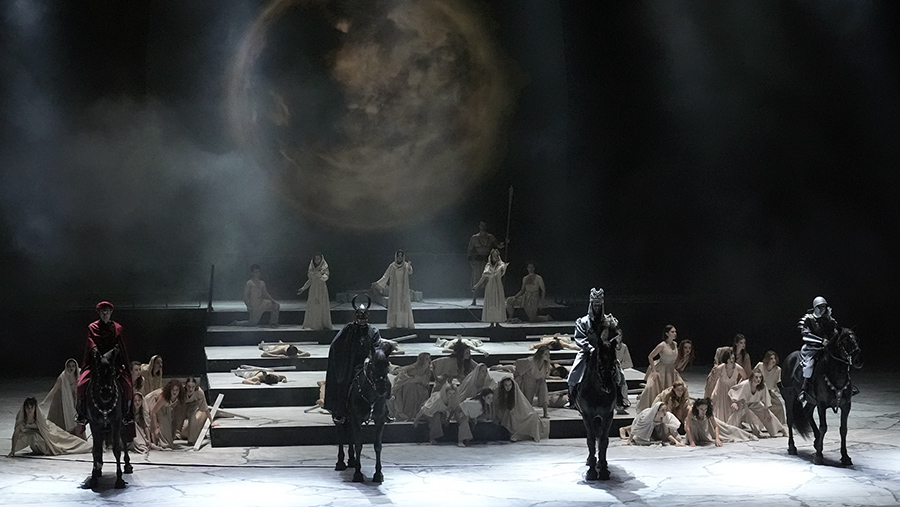
One of the most difficult scenes in the choreography is the crucifixion. It begins the second act. For the artist, the task was to do it delicately and did not go well. I wanted the audience, looking at the stage, to think about the eternal. The choreographer decided to get away from spectacular steps and supports. And when the cavalry and horsemen appeared on the stage, the audience screamed.
For the whole team, working on the Novel has become a kind of challenge. But it was accepted, and the audience appreciated the efforts and imagination of the directors.
Tickets — from 1 thousand rubles in the gallery to 25 thousand rubles in the center of the stalls. Maxim Averin's fans will love the expensive seats, because closer to the finale, the main character sits on the edge of the stage and conducts a dialogue with Afraniy (Nikolai Kozak). All tickets are sold out for the upcoming performances. But there is still an opportunity to purchase them for the February screenings.
Переведено сервисом «Яндекс Переводчик»


